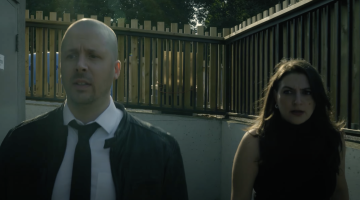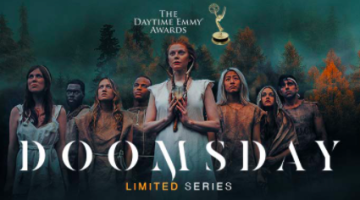The tragic events of September 11, 2001 forever changed the way we live, and gave people around the world an increased awareness of the threats posed by radical terrorism. The swift military response by the United States and its allies began a global war on terror that continues to this day, and also continues to affect the lives of those who fought to defend the freedoms we enjoy.
Since those dark days, movies like THE SUM OF ALL FEARS, the Oscar winning THE HURT LOCKER and STOP LOSS, plus TV series like 24, HOMELAND and others have used the war on terror as a backdrop for some of the most memorable, suspenseful depictions of our post 9/11 world, as well as the uncertainty and turmoil of those times.
With its first season of 7 episodes now streaming via its official web site and YouTube page (see additional links below), the new espionage thriller web series THE ROLLING SOLDIER continues that tradition, combining powerful character-based drama with gripping suspense and exciting action sequences to present the story of Black Ops CIA Agent Connor Flynn (played by series creator/writer/director John Tague).
A dedicated field operative, skilled sniper, devoted husband and colleague to CIA Black Ops interrogation/deception specialist Alisa (Alisa Allapach), Connor also prides himself on being a father to two teenage children: son Max (played by Max Tadman), and daughter Sadie (London Thor).

John Tague (series writer/creator/director) portrays CIA Black Ops agent Connor Flynn in THE ROLLING SOLDIER.
Connor’s mission on the front lines in Afghanistan was altered when he struck an IED (improvised explosive device), resulting in a devastating head injury.
His whereabouts unknown for years, Connor now secretly resides somewhere in the United States, under the watchful eye of his best friend and fellow agent Rigo Salazar (played by Rigo Sanchez), and ex-CIA operative Inga (Kiki Aldonas), who’s been charged with fully nursing Connor back to health.
Having been suspected of stealing classified film taken during operations in Afghanistan, Agent Roscoe Scott (Scott Peat) embarks on a manhunt to bring Connor to justice; a mission led by Agent Lothbrok (Mette Holt), the head of the shadowy government group that sent him there in the first place.
At the same time, Sadie seeks to uncover the truth of her parents’ fate, while Max lives without any memory of them – or any desire to find out what happened to them. Connor’s Black Ops team leader Darwin (Thompson Blake) helped him escape from the dangerous climate of Afghanistan, and now assumes the guardianship of Sadie and Max.

Alisa Allapach plays Connor’s wife and fellow CIA agent Alisa Flynn in THE ROLLING SOLDIER.
With his wife also having mysteriously vanished after Connor’s disappearance, Connor suddenly awakens from a long coma, but soon finds himself caught in the middle of a terrifying conspiracy that puts the lives of his wife and family in jeopardy, and threatens to unmask the real actions and intentions of the people he thought he could trust.
For Tague, several factors played into his decision to create, star in and direct THE ROLLING SOLDIER. Yet, as he explains, his return to acting after a considerable sabbatical, and some prescient advice he learned during a class he took, gave Tague the incentive to re-launch his once dormant career, and to teach himself the ins and outs of filmmaking – from the ground up.
“I had taken a really long break from acting after my daughter was born. I was in a weird place and felt like I needed a break from acting,” Tague says. “Five years later, I decided to get my acting career going again and enrolled in a scene study class to shake some of the acting rust off.”
Tague’s time spent attending those classes resulted in more than just a refreshed memory of acting techniques. Thanks to his instructor, he also learned about how crucial it is for any actor to create opportunities for professional growth and success in an industry where auditioning for that big break is always a game of chance.
 “While there, my acting coach always stressed how important it is to always be working on your craft and encouraged us students to make short films, web-series etc., and stressed how easy it was with all of the advances in technology, and that there really was no excuse to not do it,” Tague adds.
“While there, my acting coach always stressed how important it is to always be working on your craft and encouraged us students to make short films, web-series etc., and stressed how easy it was with all of the advances in technology, and that there really was no excuse to not do it,” Tague adds.
It just so happened that a once popular yet now seemingly outdated form of technology helped Tague find the core of THE ROLLING SOLDIER’s dramatic concept.
“I also needed new footage for my acting reel because all of my old footage was really dated and still on VHS tapes,” he says. “So that got me thinking. I had this idea about what it would be like for a soldier to wake up from a coma 10 years later after being on the battlefield and finding himself back home like nothing happened.”
Tague’s fascination with current events, specifically the revelations of Wikileaks founder Julian Assange and ex-military contractor turned government whistle-blower Edward Snowden, plus his love of conspiracy-themed Hollywood thrillers (THE DAY OF THE JACKAL, TINKER, TAILOR, SOLDIER, SPY, among others) also played heavily into his development of the story and characters in THE ROLLING SOLDIER.
 “I thought it would be interesting and I had this lingering thought that everybody in the story was hiding something from him,” explains Tague.
“I thought it would be interesting and I had this lingering thought that everybody in the story was hiding something from him,” explains Tague.
“I liked the idea of something sinister behind his accident and I thought it would be interesting to play with. Then, I thought it would be interesting to involve his family to make it more dramatic.”
With the dual goals of creating content that would not only give him a vehicle to display his abilities on both sides of the camera, but also a chance to make a conspiracy flavored thriller all his own, Tague developed a compelling character whose own inner moral conflicts drive the story and dramatic situations found in THE ROLLING SOLDIER.
“I came up with the idea that the lead character was more than just a soldier. He was a Black Ops assassin with a guilty conscience who had discovered something that involved himself, his family, and his “team” and the government didn’t want what he discovered getting out.”
Given the high instances of post traumatic stress disorder (PTSD) in combat veterans, and that Tague’s fictionalized depiction of a Black Ops agent who suffers from PTSD is the crux of THE ROLLING SOLDIER, it was critical for him to add authenticity to his performance throughout the series.
“It’s a real problem. PTSD is something that I think we are just beginning to see as a massive issue that needs a lot of attention,” he says. “I read up on the subject a lot, and wanted to give it as honest of a portrayal as I could.”
 It was also important for Tague to strike a balance between the inner and outer struggles endured by his character.
It was also important for Tague to strike a balance between the inner and outer struggles endured by his character.
“I didn’t want to beat people over the head with it too much, so I tried to keep it as internal as I could, but we all know that when people hold things in, it only gets worse, and that is what starts to happen to Connor throughout the series. He becomes more paranoid and unhinged as things go on.”
Before Tague launched the initial stages of production for THE ROLLING SOLDIER, he took a close look at the overall landscape of web series. While he gained a greater understanding of scripted content online, Tague found several common patterns in shows that didn’t exactly fit the mold of what he sought to do with his yet to be launched series.
“When I was researching the web series world before I started shooting, I knew nothing about it. What I was noticing was a lot of goofy, 20 something comedies, zombies, and mindless action shows,” says Tague. As he explored further, two popular series known for their high production values would give him the inspiration to make his own mark on the web series world.
“There were some shows that I was really impressed with like THE BANNEN WAY and L.A. MACABRE that gave me hope to do what I wanted to do,” adds Tague, who also explains that the same cinematic quality found in both of those aforementioned favorites is one of two that makes THE ROLLING SOLDIER truly unique. “I think what sets our show apart is that our show is character driven and cinematic.”

Rigo Sanchez portrays Rigo Salazar, Connor’s longtime friend and colleague, in THE ROLLING SOLDIER.
Despite the fact that THE ROLLING SOLDIER revolves around a subject most commonly associated with blood and guts – that of war and its devastating impact on those who fight in it, Tague decided to take a refreshingly measured approach to how it depicted the combat scenes found in each episode.
“Although violence is a part of our show, I wanted as little of it as possible. I think less is more, and it is much more impactful than explosions and machine gun fire every 10 seconds. I didn’t want to glorify violence at all in THE ROLLING SOLDIER,” says Tague.
Its emphasis on character driven storytelling, rather than gratuitous violence, also helped Tague’s series win several major honors from some of the industry’s most prestigious web series festivals. “In essence, it’s really a drama and it was such a validating experience when we won the 2015 Best Drama Award at the NYC Web Fest,” he responds.
With the cast comprised of actors culled from both personal and professional relationships, Tague kept their respective talents and skills in mind as he wrote the individual characters they would play in THE ROLLING SOLDIER. Over time, their experience and dedication to the project would help make the process of filming of each episode a smooth one.

London Thor plays Connor’s teenage daughter Sadie in THE ROLLING SOLDIER.
“They are all professional actors with good credits and I really trusted them,” he says.
“Some of the other actors were friends who I knew that are very good actors. Because I knew these actors so well, I was able to really tailor their characters and dialogue to their strengths. That was key. I wrote these parts for those actors specifically.”
Tague, who wrote and filmed the show’s first episode over the course of a single weekend, would also rely on a key member of his series’ production team in many ways as pre-production began for the remaining 6 episodes.
“I went back and started developing the story and writing more episodes,” adds Tague. “I had help from my cinematographer Sergio Crego on story ideas and he was essential in the planning of all of the shooting days.”
As time went on, Tague learned a lot about the amount of dedication and discipline required for anyone who’s ever written, produced and/or directed their first major production. Throughout the entire shoot, Tague would also learn just how significant those same traits are when required of an actor.
“The biggest challenge I had was playing the lead role and also being the director of the film at the same time. Playing Connor was a real challenge because most of the time he is in reaction mode, so there had to be a lot subtle work done,” recalls Tague. “He’s also in almost every shot so I had to know every single thing that was going on in the scene and completely trust the other actors to deliver. I learned a lot as an actor making this film.”
Perhaps the biggest lesson Tague learned was that when it comes to playing the starring role in any filmed project, the pressure and expectations that come with it are amplified to the most severe degree. “I learned more than anything that the lead actor really has to set the tone and raise the bar in order for everything to come together,” he says.
 For Tague, playing a grizzled, weary veteran who’s haunted by the terrifying memories of his time spent on the battlefield, and whose life has become a personal war all its own, may have been the greatest test of his abilities as an actor.
For Tague, playing a grizzled, weary veteran who’s haunted by the terrifying memories of his time spent on the battlefield, and whose life has become a personal war all its own, may have been the greatest test of his abilities as an actor.
“Connor is a very complex guy, because he is fighting against himself more than the people around him,” he says. “There was lots of physical condition work and emotional stuff to deal with. It was exhausting.”
All 7 episodes were filmed during a year long period, with money raised through IndieGoGo to help produce the remaining 6. Along with experiencing the difficulties of finding when and where to film key scenes in the series, Tague would also learn just how difficult it can be to film a web series while trying to work around the active workloads of his cast, who in many cases had commitments to other projects.
“We had long stretches where we were not able to shoot due to conflicting schedules. When you have a big cast, it can be really difficult to get everybody’s schedules synced up,” he says. “We also had a lot of locations and would have to wait until they were available for shooting.”
On many occasions, Tague and his small production crew found themselves engaging in the rough and tumble art of guerrilla filmmaking throughout the shoot.
 “We also didn’t have permits most of the time, and had to ‘run and gun’, especially on street locations,” remembers Tague. “Los Angeles can be difficult to shoot in, because they are really strict about permits. We had a lot of locals pitch in to help out with some locations, too.”
“We also didn’t have permits most of the time, and had to ‘run and gun’, especially on street locations,” remembers Tague. “Los Angeles can be difficult to shoot in, because they are really strict about permits. We had a lot of locals pitch in to help out with some locations, too.”
Given the surroundings, the decision to move quickly from place to place was understandable, but the breakneck pace of filming proved to be a major challenge for Tague’s cast and crew.
“We knew we had to move fast, so we really prepared every detail before each scene. The actors had to stick to the script. There wasn’t any room or time to improvise. Once we knew we had gotten the scene shot, then we would play around a little with improv if we had the time.”
Because THE ROLLING SOLDIER is a drama with action elements, it’s only natural that the series features several major fight sequences. While the first episode featured fight choreography arranged by John Kreng, Tague would co-manage the sequences for the remaining episodes.
 As opposed to the majority of his behind the scenes duties, this aspect of the show’s production was perhaps the easiest for Tague to take on.
As opposed to the majority of his behind the scenes duties, this aspect of the show’s production was perhaps the easiest for Tague to take on.
“I have a background in martial arts and I teach karate, so I ended up doing the rest of the choreography along with the help of William Joseph Hill,” he recalls. “Those scenes were fun to shoot.”
Another important element that added crucial dramatic weight to each episode of THE ROLLING SOLDIER was its haunting wartime flashback scenes.
With those sequences shot in the hot, dry climate of drought stricken California, the visual impact of those scenes were readily apparent in each episode. For Tague and his crew, finding a place to film those scenes was easily made possible by the place they already call home.
“Flashbacks were essential to the story and we needed locations that looked like they could pass for Afghanistan. Luckily, we live in Southern California, and there are lots of desert like locations and hills, and we’ve been going thru a massive drought here, so everything looked really dry and dusty. A lot of that footage was shot in Moorpark, California. Although it took a year to shoot, everything went very smoothly.”
Tague played many roles throughout the production of THE ROLLING SOLDIER. Not only was it a crash course on how to write, direct and produce a quality web series on a limited budget, but it was also a very taxing experience for the first time filmmaker.
“The really hard part was post-production, because I had to do pretty much all of it myself. We spent the entire budget on the shoot, leaving no money for post.”

Tague (L) and Sanchez (R) examine the script for an episode of THE ROLLING SOLDIER.
With a small amount of cash remaining from the series’ filming, Tague took it upon himself to get the best equipment he could find.
As he explains, though, there was just one problem. “I had enough money left over to buy the editing, color, audio software I needed but I had no idea how to use any of it.”
Nonetheless, Tague would dedicate himself to the arduous task of making all episodes of THE ROLLING SOLDIER look and sound as best as they could, despite his obvious lack of knowledge of the sophisticated programs he was working with, the temperamental nature of the equipment he used, and the tremendously adverse conditions he found himself working in.
“I had no experience at all with editing, color grading, soundtrack scoring, or any of the other stuff and I had to teach myself how to do everything. I had to do all of the post work in my garage with no air conditioning or ventilation in the sweltering heat in Los Angeles,” says Tague. “It was brutal. Computers and hard drives constantly overheated and crashed. I thought I’d never finish it.”
Editing each episode also gave Tague the chance to see for himself his strengths and weaknesses as an actor.
“Most actors don’t like to watch their performances on film, but I had no choice because I had to edit the thing, and in order to get over being hyper critical of my performance, I watched the playback of the edits like an athlete who watches tape of himself to improve,” he says. “I really learned what I do well, and what I was terrible at, just by sitting in the editing bay. It was a real eye opener.”

Tague and his cast accept the Best Drama Award for THE ROLLING SOLDIER at the 2015 NYC Web Fest.
Thanks to its potent mix of intelligent, character based episodic drama and powerful action, THE ROLLING SOLDIER could also potentially grow beyond the confines of the world wide web.
Having racked up several nominations and awards from other prominent web series festivals, Tague feels that the opportunities for THE ROLLING SOLDIER’s continued success are many.
“We are still waiting to hear about other web fests that we have submitted to. It’s been really exciting and has given me confidence to make more web series and films in the future. It would be great to have somebody buy THE ROLLING SOLDIER and turn it into a network show, or possibly a feature. That is something I’m really interested in doing.”
Most of all, Tague wants viewers of THE ROLLING SOLDIER to realize that war itself will leave scars that go far beyond any physical injuries suffered on the battlefield.
Through his portrayal of a man whose life is forever altered by the atrocities, fear and uncertainty he experienced while fighting for his country, Tague seeks to show viewers that the emotional wounds of veterans are just as painful, if not more so, than those experienced by the body.

Tague, posing with the 2015 NYC Web Fest’s Best Drama trophy for THE ROLLING SOLDIER.
“I hope that people who see the series come away with a more compassionate outlook on what war and violence can do to a person,” he says.
“THE ROLLING SOLDIER is heightened fiction with a thriller twist, but it was important to me to make Connor a really sensitive human being who was trying to cope the best he could. I hope I represented people with PTSD well.”
With equal parts action, suspense and human drama found in every episode, THE ROLLING SOLDIER proves that sometimes, doing what’s right – no matter how difficult or who it impacts – can have devastating consequences.
“Thematically, THE ROLLING SOLDIER is a political/espionage/crime thriller,” says Tague, summing up the show overall. “The message behind THE ROLLING SOLDIER is transformation, and knowing that the right thing to do could cost you everything.”
(NOTE: The series is not currently closed-captioned or subtitled.)
ON THE WEB: www.therollingsoldier.com
YOUTUBE: www.youtube.com/TheRollingSoldier
FACEBOOK: www.facebook.com/TheRollingSoldier
TWITTER: @TheRollingSoldi










No Comment